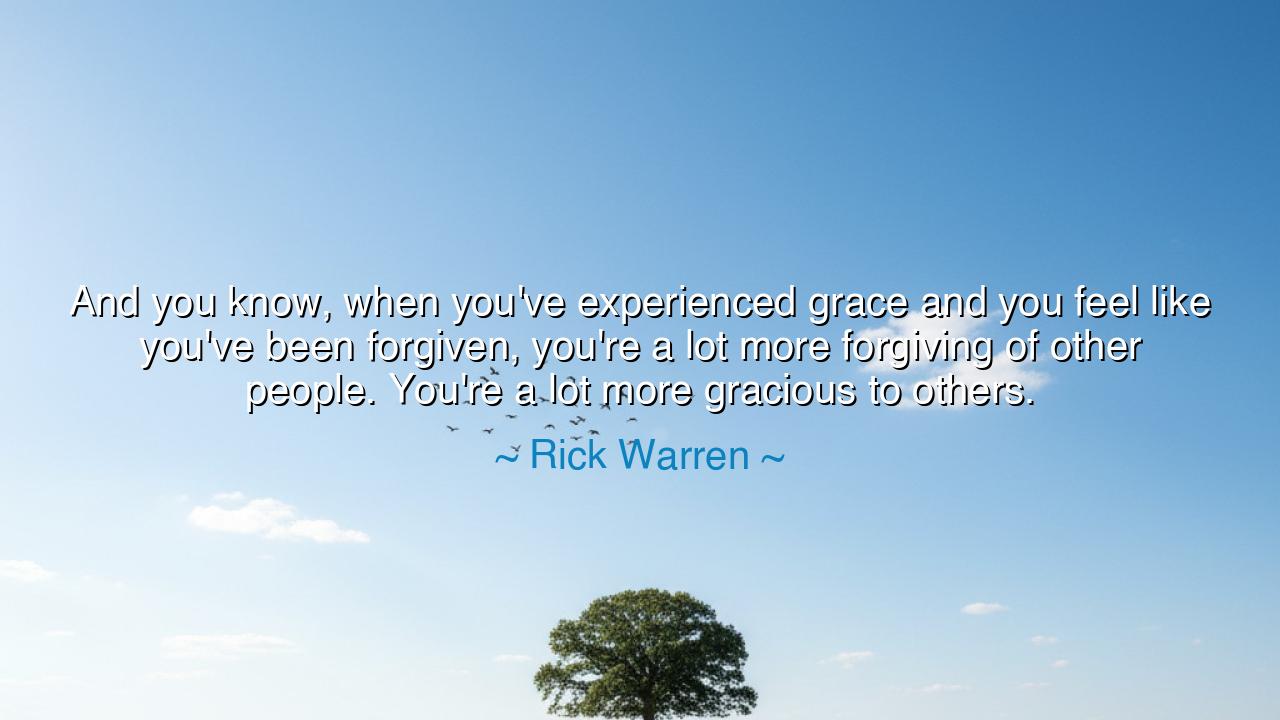
And you know, when you've experienced grace and you feel like
And you know, when you've experienced grace and you feel like you've been forgiven, you're a lot more forgiving of other people. You're a lot more gracious to others.






Opening Scene
The room is gently illuminated by the soft, fading light of the afternoon, casting a warm glow over everything. The world outside feels quiet, the bustle of the city distant as the evening sets in. Jack sits at the table, his hands resting on an open book, his gaze distant. Jeeny stands by the window, arms loosely crossed, looking out into the city below. The atmosphere feels reflective, as if a deeper conversation is waiting to unfold.
Host: After a few moments, Jeeny turns from the window, her voice calm but thoughtful, breaking the silence.
Jeeny: “I came across a quote by Rick Warren that really stuck with me. He said, ‘And you know, when you’ve experienced grace and you feel like you’ve been forgiven, you’re a lot more forgiving of other people. You’re a lot more gracious to others.’ It made me think about how forgiveness can change us — not just in how we interact with others, but in how we see ourselves. How do you think forgiveness, especially the experience of receiving it, impacts our ability to be more gracious toward others?”
Jack: “It’s a profound thought, isn’t it? When we experience grace — when we truly understand what it feels like to be forgiven — it changes our perspective on life. We realize how much we need grace ourselves, and that realization makes it easier to extend it to others. It’s like this internal shift that occurs. The more we accept forgiveness and grace, the more compassionate and understanding we become toward those around us.”
Jeeny: “Exactly. It’s as if receiving grace allows us to see the humanity in others. We start to understand that no one is perfect — that everyone makes mistakes, just like we do. And when we feel the weight of that forgiveness, it softens us. We become more empathetic and less judgmental. It’s as if grace creates space for us to be more generous in how we view and treat others.”
Jack: “Right. It’s like forgiveness doesn’t just heal the person who’s been forgiven; it also heals the one doing the forgiving. When we let go of resentment or anger, we’re able to move forward with a lighter heart. We’re no longer weighed down by the need for retribution or perfection. And when we feel that sense of freedom, it becomes easier to extend that grace to others, to understand their flaws without holding them against them.”
Host: The conversation deepens, and Jeeny walks over to the table, sitting across from Jack, her voice steady as she continues.
Jeeny: “And it’s interesting how grace can be so transformative, not just in terms of our relationships with others, but in how we view ourselves. When we experience forgiveness, we realize that we’re not defined by our past mistakes. That realization gives us the freedom to be more forgiving toward others, because we can see that we all carry imperfections. Grace teaches us that it’s okay to be flawed, and that others deserve that same understanding.”
Jack: “Exactly. When we experience grace, it shifts the way we perceive failure. It’s not a permanent label or something that defines us. It’s a moment — a mistake — that can be overcome. And because we’ve been given grace, we are able to offer it more freely, recognizing that everyone is deserving of second chances. It’s the cycle of grace: we receive it, and in turn, we give it.”
Jeeny: “And I think that’s where healing happens — in the act of giving and receiving grace. It’s not just about forgiving others, it’s also about forgiving ourselves. When we accept grace and forgiveness, we’re able to move beyond the shame and guilt of past actions, allowing ourselves to grow. And then, we’re more inclined to extend that same forgiveness to others, knowing how much it has helped us.”
Jack: “Yes, exactly. And it’s not just about being forgiving in small, everyday moments. It’s about transforming the way we live. When we truly understand grace, we start to lead with it in every interaction. We stop holding grudges, we stop letting past wrongs define our relationships, and we start to build a culture of kindness and compassion — both for ourselves and for others.”
Host: The room feels quieter now, the weight of their conversation lingering in the air. Outside, the city continues at its usual pace, but inside, Jack and Jeeny share a realization — that grace isn’t just a concept or an abstract idea. It’s a practice, something that transforms the way we interact with the world, with ourselves, and with others. By receiving grace, we open ourselves to be more gracious, more understanding, and ultimately, more human.
Jeeny: “So, maybe the key is accepting grace in our own lives — really understanding what it means to be forgiven — and letting that guide the way we treat others. When we feel the freedom of grace, we are more willing to give it.”
Jack: “Exactly. Grace is a cycle. The more we receive, the more we have to give. And in giving grace, we create deeper, more authentic connections with others. It’s not about perfection; it’s about understanding and compassion.”
Host: As the evening unfolds, Jack and Jeeny are left with the realization that true grace is not just about forgiveness; it’s about transforming ourselves and our relationships. When we allow grace to flow through us — when we accept it, offer it, and live by it — we create a more compassionate world. It’s in this practice that we find the freedom to heal, to forgive, and to truly connect with others.






AAdministratorAdministrator
Welcome, honored guests. Please leave a comment, we will respond soon